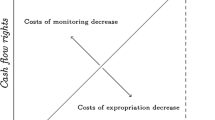Abstract
A sample of 6169 firm year observations in 14 western European countries between 2002 and 2009 is used to investigate how committee practice within boards of directors is related to company characteristics, and to the existence of alternative corporate governance instruments in place. We find that committees in Europe are prevalent in larger companies, and in companies with large and independent boards. However, we also find that leverage, director interlocking, concentrated ownership, and the presence of managers on the board mitigate the use of committees, suggesting that committee use is limited by the existence of alternative governance mechanisms. Consequently, recent regulatory changes in Europe that promote the creation of committees within boards may be unsuited for certain types of company, especially smaller companies and those with concentrated ownership.
Similar content being viewed by others
Notes
Recommendation on the role of (independent) non-executive or supervisory directors, European Commission Internal Market Directorate/General. Commission Recommendation 2005/162/EC of 15th February, 2005.
European Commission Recommendation 2005/162/EC of 15th February 2005 on the role of (independent) non-executive or supervisory directors, page 9.
Casual evidence indicates that companies—except in the case of restructurings—change their governance structure very slowly. We expect yearly changes to be small.
References
Adams R, Ferreira D (2007) A theory of friendly boards. J Financ 62(1):217–250
Anderson R, Mansi SA, Reeb DM (2004) Board characteristics, accounting report integrity and the cost of debt. J Account Econ 37(3):315–342
Agrawal A, Chadha S (2005) Corporate governance and accounting scandals. J Law Econ 48(2):371–406
Brandes P, Dharwadkar R, Suh S (2015) I know something you don’t know!: the role of linking pin directors in monitoring and incentive alignment. Strateg Manag J. doi:10.1002/smj.2353
Beasley MS (1996) An empirical analysis of the relation between the board of director composition and financial statement fraud. Account Rev 71(4):443–465
Benjamin SJ, Karrahemi KE (2013) A test of audit commmittee characteristics and free cash flows. Corp Ownersh Control 10(2):611
Bronson S, Carcello J, Hollingsworth C, Neal T (2009) Are fully independent audit committees really necessary? J Account Public Policy 28(4):265–280
Carcello JV, Neal TL, Palmose ZV, Scholz S (2011) CEO involvement in selecting board members, audit committee effectiveness, and restatements. Contemp Account Res 28(2):396–430
Faleye O, Hoitash R, Hoitash U (2011a) The cost of intense board monitoring. J Financ Econ 101(1):160–181
Faleye O, Hoitash R, Hoitash U (2011b) Advisory directors. doi:10.2139/ssrn.1866166. Available at SSRN: https://ssrn.com/abstract=1866166
Ferris SP, Jagannathan M, Pritchard AC (2003) Too busy to mind the business? Monitoring by directors with multiple board appointments. J Financ 58(3):1087–1111
Gerety M, Hoi C, Robin A (2001) Do shareholders benefit from the adoption of incentive pay for directors? Financ Manag 30(4):45–61
Hadani M, Goranova M, Khan R (2011) Institutional investors, shareholder activism, and earnings management. J Bus Res 64(12):1352–1360
Jiraporn P, Singh M, Lee C (2009) Ineffective corporate governance: director busyness and board committes memberships. J Bank Financ 33:819–828
Joseph J, Ocasio W, McDonnell M (2014) The structural elaboration of board independence: executive power, institutional logics, and the adoption of CEO-only board structures in U.S. corporate governance. Acad Manag J 57(6):1834–1858
Karamanou I, Vafeas N (2005) The association between corporate boards, audit committees, and management earnings forecasts: an empirical analysis. J Account Res 43(3):453–486
Kuo C, Yu S (2014) Remuneration committee, board independence and top executive compensation. J Risk Financ Manag 7(2):28–44
La Porta R, Lopez-de-Silanes F, Shleifer A (2008) The economic consequences of legal origins. J Econ Lit 46(2):285-33
Misangyi VF, Acharya AG (2014) Substitutes or complements? A configurational examination of corporate governance mechanisms. Acad Manag J 57(6):1681–1705
Reeb D, Upadhyay U (2010) Subordinate board structures. J Corp Financ 16:469–486
Upadhyay A, Bhargava R, Faircloth S (2014) Board structure and role of monitoring committees. J Bus Res 67:1486–1492
Vafeas N (2005) Audit committees, boards, and the quality of reported earnings. Contemp Account Res 22(4):1093–1122
Zajac EJ, Westphal JD (1994) The costs and benefits of managerial incentives and monitoring in large U.S. corporations: When is more not better? Strateg Manag J 15:121–142
Acknowledgements
The authors benefited from the valuable comments of T. Berglund, R. Crespi, V. Cuñat, B. García-Osma, C. Fernandez, S. Shankar, A. Glazer (the editor) and a referee, as well as participants at the XXIII Finance Forum (Madrid), the 2015 Eastern Finance Association Meeting (New Orleans), 4th International Finance and Banking Society Conference (Valencia), and participants in seminars in University of Burgos, Hanken School of Economics and Ramón Areces Foundation. Financial support from the Spanish Ministry of Economy and Competitiveness (Grant ECO2012-32554) is gratefully acknowledged. Any errors are the sole responsibility of the authors.
Author information
Authors and Affiliations
Corresponding author
Rights and permissions
About this article
Cite this article
Andrés, P.d., Arranz-Aperte, L. & Rodríguez-Sanz, J.A. Delegation of board work to committees in Europe. Econ Gov 18, 179–208 (2017). https://doi.org/10.1007/s10101-017-0191-y
Received:
Accepted:
Published:
Issue Date:
DOI: https://doi.org/10.1007/s10101-017-0191-y




